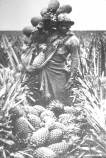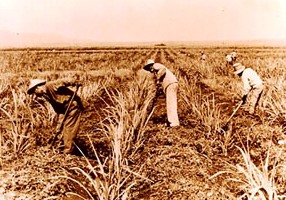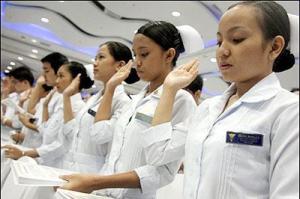“Filipinos…we’re always trying to avail ourselves, to make that difference in other people’s lives.” ~ Danny A. Mateo, First council member of Filipino descent to be elected as Maui County Council chairman.
 On December 20, 1906, onboard the SS Doric, the first group of 15 sakadas, or contract laborers, recruited by the Hawaiian Sugar Planters Association, arrived to work on the sugar plantations. They were not the first Filipinos in Hawai`i — others known as “Manila Men” were in Hawaii at the time of the monarchy. At least six were involved with the Royal Hawaiian Band.
On December 20, 1906, onboard the SS Doric, the first group of 15 sakadas, or contract laborers, recruited by the Hawaiian Sugar Planters Association, arrived to work on the sugar plantations. They were not the first Filipinos in Hawai`i — others known as “Manila Men” were in Hawaii at the time of the monarchy. At least six were involved with the Royal Hawaiian Band.
But the arrival of the sakadas marked the beginning of an aggressive campaign to recruit Filipino plantation labor. When they reached Hawai`i the oppressive plantation system was already entrenched.
 Between 1906 and 1930, the HSPA brought in approximately 120,000 Filipinos, and by 1930 the sakadas had become the majority of the plantation workforce, replacing the Japanese. The last group of 6,000 sakadas arrived in 1946, shortly before Philippine independence was regained from the United States.
Between 1906 and 1930, the HSPA brought in approximately 120,000 Filipinos, and by 1930 the sakadas had become the majority of the plantation workforce, replacing the Japanese. The last group of 6,000 sakadas arrived in 1946, shortly before Philippine independence was regained from the United States.
After that the quota was limited to 50 a year, later increased to 100. It was only toward the late 1950s that immigration laws enabled Filipinos already in Hawai`i to get their families beyond the quotas.
 And in 1965, immigration laws were liberalized to admit not only family members but also professionals, including doctors, nurses, engineers, lawyers, accountants, teachers, health technicians and others with college educations and marketable skills.
And in 1965, immigration laws were liberalized to admit not only family members but also professionals, including doctors, nurses, engineers, lawyers, accountants, teachers, health technicians and others with college educations and marketable skills.
Today more immigrants come to Hawai`i from the Philippines than from any other country.
About 36,000 Maui County residents are of Filipino ancestry. For over a century their growing influence in labor, business, education, and government has enriched the unique fabric of our Maui Nui community.
“If there is any hope that we, as a unified, humble, and powerful Filipino community on Maui will grow and prosper, we must honor our past …” ~Megan Bagoyo, Granddaughter of a sakada, From ANAKA Tribute to Maui’s Filipinos


